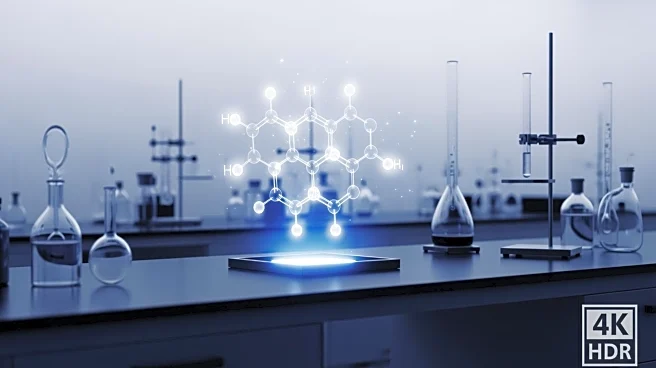What's Happening?
Chemists have developed a new deep eutectic solvent (DES) based on arginine and glutaric acid, which serves as a potent catalyst for synthesizing pyranopyrimidines. DESs are mixtures that remain liquid
at room temperature and are favored for their environmental friendliness and ability to dissolve both polar and nonpolar compounds. The newly developed DES, referred to as ARG/GLU-DES, was created by mixing arginine and glutaric acid at 70°C until a homogeneous liquid was formed. This solvent was then used in a one-pot, three-component condensation reaction involving aromatic aldehydes, barbituric acid, and 4-hydroxy-coumarin at 80°C in solvent-free conditions. The process offers several advantages, including a clean reaction profile, mild conditions, short reaction times, and high atom economy, making it a promising green chemistry solution.
Why It's Important?
The development of ARG/GLU-DES as a green catalyst is significant for advancing sustainable practices in chemistry. Traditional solvents often involve toxic and hazardous materials, whereas DESs provide a safer and environmentally friendly alternative. The use of natural DESs, like ARG/GLU-DES, aligns with the growing demand for green chemistry solutions that minimize environmental impact. This innovation could lead to more sustainable industrial processes, reducing the reliance on harmful chemicals and promoting biocompatibility. Industries involved in pharmaceuticals, agriculture, and materials science stand to benefit from these advancements, as they can adopt more efficient and eco-friendly synthesis methods.
What's Next?
The successful application of ARG/GLU-DES in synthesizing pyranopyrimidines may encourage further research into other natural DESs and their potential uses as catalysts in various chemical reactions. As industries seek to reduce their environmental footprint, the adoption of green solvents like ARG/GLU-DES could become more widespread. Researchers may explore the synthesis of other N-heterocycles using DESs, potentially leading to new pharmaceuticals and materials with enhanced properties. Additionally, the economic benefits of using low-cost, commercially available starting materials could drive broader implementation across different sectors.
Beyond the Headlines
The use of DESs in chemical synthesis not only promotes environmental sustainability but also highlights the importance of atom-efficient processes. By incorporating most carbon atoms into the final product, multicomponent reactions like those facilitated by ARG/GLU-DES reduce waste and improve resource utilization. This approach aligns with global efforts to enhance efficiency and sustainability in manufacturing and chemical production. Furthermore, the biocompatibility of natural DESs could lead to safer products for consumers, particularly in the pharmaceutical and agricultural industries.










